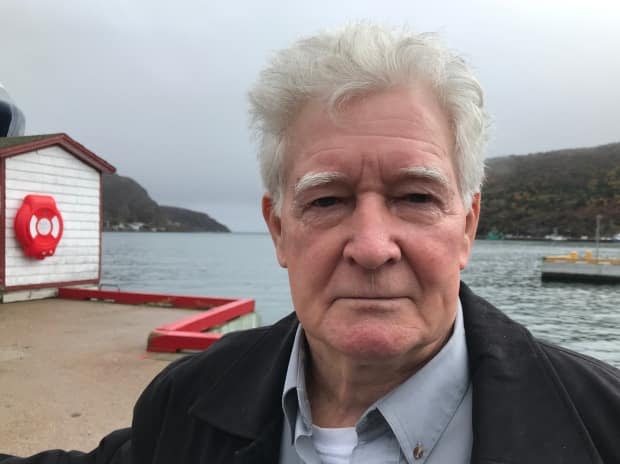Salmon disease was present but Northern Harvest denies it was a factor in die-off
The aquaculture company at the centre of a massive fish die-off on Newfoundland's south coast is on the defensive again after a revelation Tuesday that disease was detected in its sea cages this summer.
But Northern Harvest Sea Farms denies that infectious salmon anemia was a factor in the disastrous loss of 2.6 million Atlantic salmon, with a total weight of 5,000 tonnes.
"The temperature event that took place in late August that led to the mass mortality happened well after the ISA fish in question were sampled," Northern Harvest wrote in a post on its Facebook page Tuesday night.
A news release from aquaculture giant Mowi ASA, which owns Northern Harvest, said the loss is insured, but will represent a third-quarter hit of five million euros, or $7.3 million Cdn, for Mowi Canada.

Meanwhile, critics say this latest development is further proof that the aquaculture industry cannot be trusted and needs to be better regulated.
"This industry is characterized by deceit, deception, misleading statements, statements that don't include all of the facts," Leo White, a spokesperson for the Newfoundland and Labrador Coalition for Aquaculture Reform, told CBC News on Wednesday.
No interviews
Northern Harvest spokesman Jason Card declined an interview request Wednesday, referring CBC instead to the company's statement on social media.
The statement says ISA was "suspected" in five of the 166 cages in the water during testing that took place in July and early August.
"As soon as ISA was detected, our company took immediate action to address the issue, and the cages nearby have been under enhanced surveillance by the province. They continue to test negative," reads the statement.
The company says 120,000 fish were harvested immediately as a precautionary measure, and stressed that ISA is not a threat to human health.
"The 2.6 million fish counted among the mass mortalities that were removed do not include the fish that were harvested because ISA was suspected," the statement says.
ISA not mentioned during new conference
But the latest revelation raises more questions about how the company has handled a situation that has once again catapulted the industry into the spotlight.
The presence of ISA was not mentioned during a wide-ranging news conference hosted by Northern Harvest officials on Friday, during which the company revealed the true magnitude of the die-off.
The two separate outbreaks of ISA were instead revealed through a posting on the Canadian Food Inspection Agency's website on Tuesday.
"What it tells me is that you cannot under any circumstances trust this industry," White said of the non-disclosure.

Fisheries Minister Gerry Byrne also announced Friday that 10 of the company's 47 licences in Newfoundland and Labrador have been suspended for "non-compliance."
Byrne has not been available for interview requests, and spent the Thanksgiving weekend on the south coast, meeting with workers and community leaders.
CBC News sent a text message to Card, asking why the ISA detection was not disclosed on Friday. Card did not respond.
Union went public
Fish began dying in massive numbers in mid-August because of what the company calls a prolonged stretch of unusually warm water temperatures, which lowered oxygen levels, causing the fish to suffocate.
The company says it began apprising government, municipal and Indigenous leaders, workers, and the Fish, Food & Allied Workers union of the die-off in early September.
But it wasn't until the union expressed concern about the situation that the public became aware later in September.
Byrne was aware of the die-off, but instead of making it public, urged the company to do so. The minister also suggested the total die-off was less than two million fish, and said he was blindsided by Friday's revelation that the numbers were much higher, leading to the licence suspension.
Cleanup could be done by end of the week
"We were too focused on cleanup efforts, and we have learned from this experience," Northern Harvest managing director Jamie Gaskill told reporters on Friday in relation to the late disclosure of the die-off numbers.
The company has stated the cleanup could conclude by the end of this week.
The government has announced that Memorial University will conduct an independent, third-party review of the fish die-off, but the aquaculture coalition is not satisfied.
"We need a public review similar to an inquiry. It has to be done under some authority like the Public Inquiries Act," said White, with the authority to subpoena witnesses and compel testimony.
It can't be regulated to let the industry do what they like. And that's the way it's been. They are accountable to no one. - Leo White
The aquaculture coalition includes 20 groups and a cross-section of scientists, and was formed in 2016 to press for increased environmental scrutiny of the massive Grieg NL aquaculture project in Placentia Bay.
White said his group is not opposed to aquaculture, but is fighting for regulations that mirror or surpass those in places like Norway and Maine.
"Newfoundland's regulations are not nearly good enough," said White.
"It can't be regulated to let the industry do what they like. And that's the way it's been. They are accountable to no one."
Read more from CBC Newfoundland and Labrador


